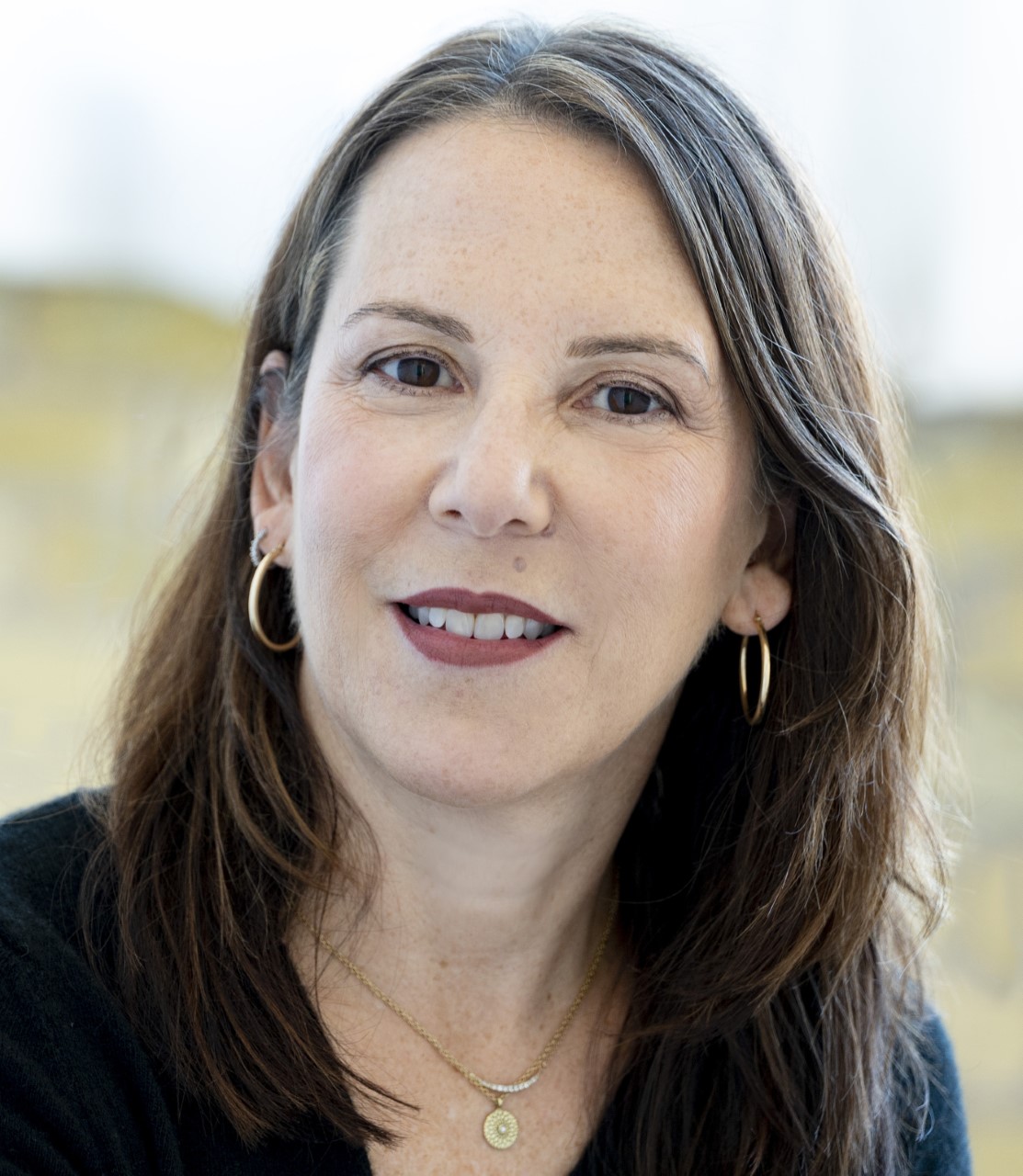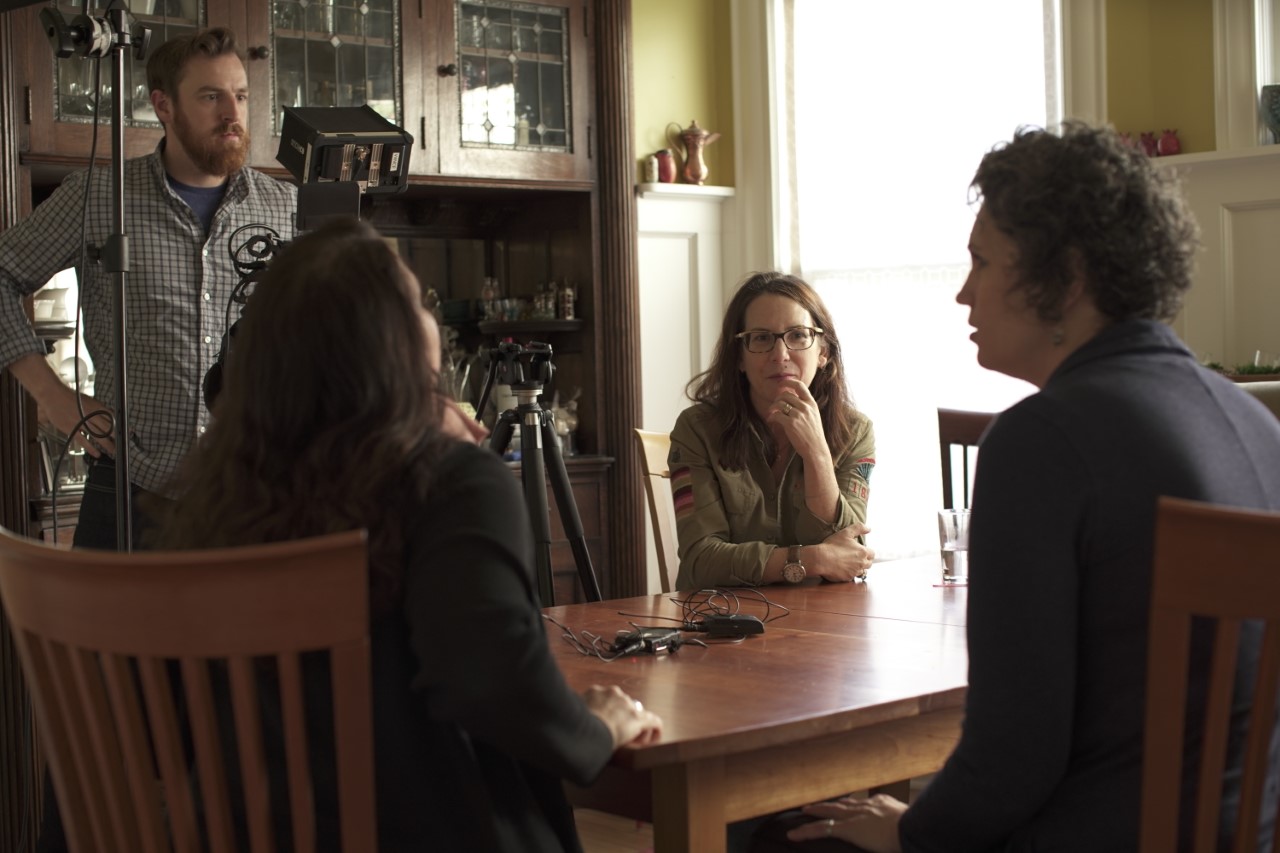Through the Lens
Documentary filmmaker Norah Shapiro (’89) draws on her experience as a public defender to explore complex topics on screen.

Photos courtesy of Norah Shapiro
Through the Lens
Documentary filmmaker Norah Shapiro (’89) draws on her experience as a public defender to explore complex topics on screen.
The camera catches early-morning light filtering onto a tree-lined suburban street. An onscreen caption reads, “Primary Day: August 9, 2016.” Next comes a tight shot of a modest stucco home with a light on in an upstairs window. According to a new caption, it’s 6 am.
Cut to the interior of the home, where a woman in a royal blue headscarf closes her eyes and mouths a silent prayer. She continues to pray as she bows and then kneels, pressing her forehead to the floor.
Later that same day, we see the woman fall to her knees again—this time, crying tears of disbelief and joy. We are inside the campaign headquarters of political newcomer and Somali American Ilhan Omar, and she has just clinched her party’s nomination for a seat in the Minnesota House of Representatives.
These are scenes from the award-winning documentary Time for Ilhan, directed by Minneapolis-based filmmaker Norah Shapiro. The film chronicles Omar’s successful campaign to represent Minnesota District 60B, beating out rivals Phyllis Kahn, the Jewish woman and second-wave feminist who’d held the seat for 43 years, and Mohamud Noor, a Somali American man who’d nearly won the seat in the previous election cycle.
Shapiro (’89) uses documentary film to explore important topics, such as the racial, religious, and gender dynamics in American politics. Before becoming a filmmaker, she spent 12 years working as a public defender in Minneapolis, and much of what she loves about her current work parallels what she enjoyed about representing defendants in the criminal system.
“I’m drawn to subjects that are complicated,” she says, “and I love that complexity.”
Shapiro relishes creating a film that explores a multilayered subject, she says, in much the same way she enjoyed working in the courtroom to paint a fuller picture of a defendant whom others had prejudged, incorrectly assuming they knew the whole story.
Public Defender to Filmmaker
After studying international relations at Tufts University, Shapiro enrolled at BU Law with her sights on a career in public-interest law. Within her first year, she says, “the criminal-defense bug got me.”
During her 12 years with the Hennepin County Public Defender’s Office in her home state of Minnesota, Shapiro’s cases ran the gamut: from misdemeanor shoplifting to child protection, burglary, and murder.
“I loved it,” she says. “I actually thought that was going to be my career for the long haul, and I had a very hard time leaving it. Looking back, it was probably quite a few years that I’d been itching to do something else, but I was torn about leaving because I loved it so much, and I felt that it was such important work.”
The craving to do something different with her time and talents finally won out, however, and Shapiro quit her job in 2002 to explore other careers. To her surprise, her search for a new path took no time at all. Soon after leaving the public defender’s office, she enrolled in a documentary filmmaking workshop and was immediately bitten by a new bug.
Shapiro worked as a production assistant on another director’s film and then began making films of her own. In 2007, she established a production company, Flying Pieces Productions. The name, she says, reflects her role as a filmmaker—pulling various pieces together to construct compelling stories. Since launching the company, Shapiro has created numerous promotional films for clients, including local politicians and nonprofits, and several feature-length films, financed mainly through grants and other awards.
Making Time for Ilhan
Shapiro became interested in the Twin Cities’ Somali immigrant community while working on her first feature-length project, a film about a theatre program for at-risk kids. Several years later, she approached a Somali American friend with an idea for a film about Somali American women whose sons were facing criminal terrorism charges. The friend didn’t think the Somali community would trust an outsider to tell that story.
“She shut that down, but in the course said, ‘You know, you should have coffee with my sister.’”
The sister was Ilhan Omar, a community educator who was preparing to run for state office. Shapiro and Omar met and had immediate chemistry. More importantly, Omar and her team were willing to let Shapiro document her campaign in detail.
“They said yes to all of my requests, which included complete, independent access—behind the scenes, at home, to family life, not just on the campaign trail. And we were off and running.”
Time for Ilhan debuted at the Tribeca Film Festival in 2018 and soon after aired on FUSE TV. It was heavily screened at film festivals and on college campuses. The film won Shapiro a Daytime Emmy Award for outstanding directing and was nominated for an NAACP Image Award. The film is both an entertaining portrait of a rising political star—Omar served one term in the Minnesota House before being elected to Congress—and an enlightening primer on grass-roots political campaigns. In her director’ statement, Shapiro says she hopes the film will serve as a how-to for “anyone who has felt that the political system is impenetrable and hopeless, for how they can show up and make change.”

Full Circle
Shapiro’s current project, a film called Magic & Monsters, is bringing her back to her roots in criminal law. The documentary, scheduled for completion in 2023, examines a history of sexual abuse at the Minnesota Children’s Theatre Company. It’s a heavy subject, Shapiro admits, but the film has a hopeful side: she believes it can provide a blueprint for how individuals and communities can heal in the wake of trauma.
“One of the themes we’re looking at is the question of institutional courage,” she says. “When institutions are confronted with past misconduct, how do they handle that? And how is trauma addressed?”
Shapiro says her legal training has often been an asset during her filmmaking career, but it’s been crucial in the making of Magic & Monsters.
“The practical and analytical skills I developed through my legal education and practice have given me an incredible boost in navigating the complexities of this story: being able to parse thousands of pages of criminal investigations, pleadings, depositions and court filings; interpret changing statutory landscape,” she says. “Having trained as a lawyer and worked as a public defender, including on cases involving sexual assault charges, I have an insider’s understanding of the way the legal system works—and does not work so well—in these kinds of cases.”
